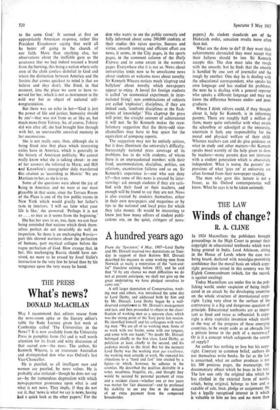A hundred years ago
From the 'Spectator,' 4 May, I867—Lord Derby and Mr. Disraeli received two deputations on Tues- day in support of their Reform Bill. Disraeli described his measure to some working men from Norwich as really a restoration of the "scot-and- lot" franchise existing before 1832, and he said that "if by any chance we meet difficulties we do not at present anticipate, we shall not give up the great undertaking we have pledged ourselves to carry out."
A still larger deputation of Conservatives, work- ing men and others, was introduced the same day to Lord Derby, and addressed both by him and by Mr. Disraeli. Lord Derby began by a well- deserved compliment to Mr. Disraeli's management and tact, and then proceeded to object to the classi- fication of working men as a separate class, which was the strong point of the Tory party last session. He identified himself and his colleagues with work- ing men. "We are all of us working men. Some of us work with our brains, some with our tongues, and some with our hands." No doubt Mr. Disraeli belonged chiefly to the first class, Lord Derby, as politician at least, chiefly to the second, and his audience mostly to the third. But for the moment Lord Derby was the working man par excellence, the working man actually at work. He repeated his objections to a "hard and fast" line created by a figure—to which, however, he adheres in the counties. He described the qualities desirable in a voter, steadiness, frugality, etc., and thought they would be secured by personal payment of rates and a resident clause—whether one or two years was matter for 'fair discussion'—and he professed his inability to see any fine in the demand of an extra payment from the compound householder.


































 Previous page
Previous page